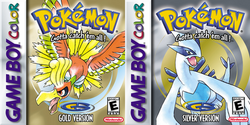Pokémon Gold and Silver
|
Pokémon Gold Pokémon Silver |
|
|---|---|

North American box art for Pokémon Gold Version, depicting the legendary Pokémon Ho-Oh. The box art for Pokémon Silver Version depicts the legendary Pokémon Lugia (not pictured).
|
|
| Developer(s) | Game Freak |
| Publisher(s) | Nintendo |
| Director(s) | Satoshi Tajiri |
| Producer(s) | Takehiro Izushi Takashi Kawaguchi Tsunekazu Ishihara Shigeru Miyamoto |
| Designer(s) | Satoshi Tajiri |
| Artist(s) | Ken Sugimori |
| Writer(s) | Toshinobu Matsumiya Kenji Matsushima |
| Composer(s) |
Junichi Masuda Go Ichinose Morikazu Aoki |
| Series | Pokémon |
| Platform(s) | Game Boy Color |
| Release date(s) |
|
| Genre(s) | Role-playing video game |
| Mode(s) | Single-player, multiplayer |
| Aggregate score | |
|---|---|
| Aggregator | Score |
| GameRankings | 89% (Gold) |
| Review scores | |
| Publication | Score |
| Famitsu | 33 of 40 |
| GameSpot | 8.8 of 10 (Gold) |
| IGN | 10 of 10 (Gold) |
| Nintendo Power | 8.7 of 10 (Gold) |
Pokémon Gold Version and Silver Version are the second installments of the Pokémon series of role-playing video games, developed by Game Freak and published by Nintendo for the Game Boy Color. They were released in Japan in 1999, Australia and North America in 2000, and Europe in 2001. Pokémon Crystal, a special edition, was released roughly a year later in each region. In 2009, Nintendo remade Gold and Silver for the Nintendo DS as Pokémon HeartGold and SoulSilver.
The games introduce 100 new species of Pokémon, and follow the progress of the central character, whose name the player may choose, in his quest to master Pokémon battling. Both games are independent of each other but feature largely the same plot and, while both can be played separately, it is necessary to trade between them and their backward compatible predecessors in order to fully complete the games' Pokédexes. The Johto Saga of the Pokémon anime is based on the new region introduced in the games.
Pokémon Gold and Silver were critically acclaimed upon release and they are considered by many to be the best games in the entire series, as well as some of the fifth generation console gaming's most significant titles. They continued the enormous success of their predecessors as Pokémon began to form into a multi-billion dollar franchise. The games almost matched the sales of Pokémon Red and Blue and went on to jointly sell millions of copies worldwide. By 2010, the recorded sales of Gold and Silver were at 23 million units.
...
Wikipedia
